The direct answer is that it depends on your business needs. In our experience as a digital marketing agency where we have built hundreds of client websites, each program has specific characteristics, some that are geared toward those who are more tech-savvy and some that are geared towards those who lack coding knowledge.
Either way, both WordPress and Wix are two excellent content tools that you can use to help boost your brand and expand your business.
Using extensive research and knowledge of what’s most important when building a site, we went in-depth about the top features and compared the two, so you don’t have to.
Without further ado, let’s dive into some of the key variances between them so you can make an informed decision about which offers the best fit.
What is WordPress?
WordPress is a well-known CMS (Content Management System) that allows users to build, customize, and host a website. Plenty of plugins and templates are available, both paid and free, so you can design your site to bring your portfolio, business, online store, or blog to life.
What is Wix?
Wix is a website builder (cloud-based) that also includes design and web host services. The drag-and-drop editor and other content tools are easy to use, and the more than 500 pre-made templates ensure you can build an aesthetically pleasing website.
The best part is that you won’t have to hire a web developer or possess any coding knowledge to design your site.
WordPress vs Wix Comparison: Top Features and Differences
Now that you have a general idea of what both programs offer, here are the top features you’ll want to consider when comparing WordPress vs Wix.
Designing and Editing
The editing experience is quite different from WordPress vs Wix, as one is easier to use but offers less customization (Wix). The other is highly customizable but has a steeper learning curve (WordPress).
Wix
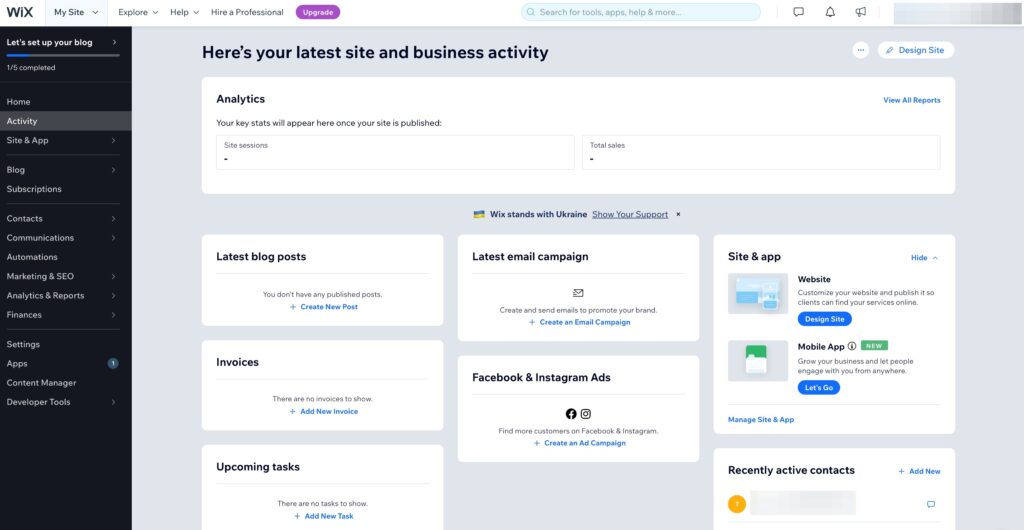
The primary difference between editing in WordPress vs Wix is that with Wix, you’re operating on a front-end interface. The benefit is that you can view your edits in real time as you construct the website in the CMS.
Building a website has three editing options: Velo, Wix ADI, and Wix Editor. Though they may offer different options, the process of adding or editing content is similar.
You can easily drag and drop slideshows, pictures, action buttons, paragraphs, and more anywhere you want on the webpage. Additionally, it only takes a few clicks to resize objects and text. Even creating a firm stays in the video as you create it on the page editor.
Nonetheless, there are still a few areas where the platform could improve the editing experience. You cannot create your own template from scratch as you can with the WordPress editor.
However, Wix has been designed to accommodate a beginner or mid-level website creator so that some areas won’t be as advanced. You can still create a stunning and personalized website using the Wix Editor.
WordPress
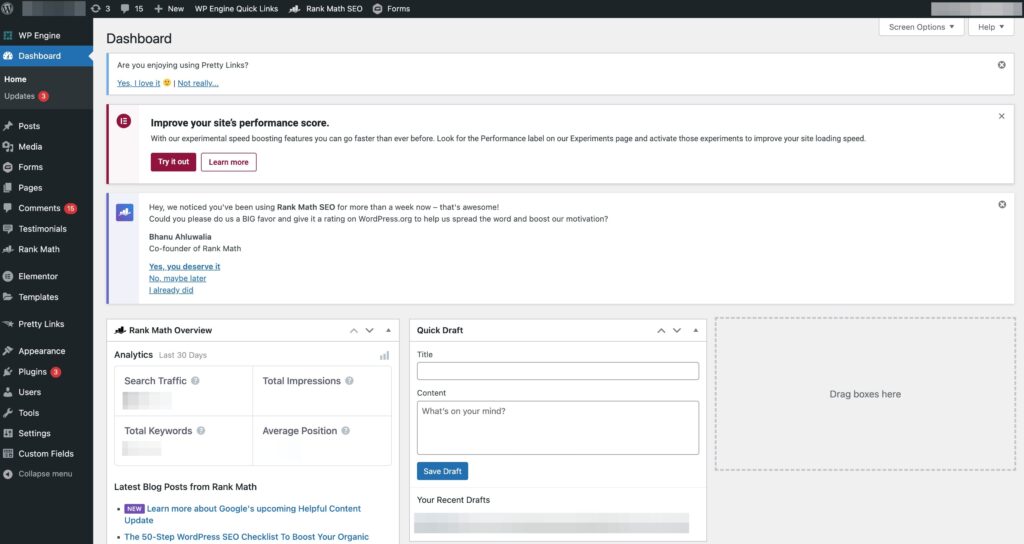
WordPress utilizes a block-based editor (Gutenberg) instead of the cloud. With this setup, things are abstracted on a different page that you can’t view while you make changes.
So, for example, if you create any forms with a plugin like WPForms, you’ll have to use a different interface. Another example would be adding a search plugin. From there, you must embed those forms into your web pages with a short code. This type of editing is on the backend instead of the front end, like Wix.
The Gutenberg editor requires you to switch back and forth between the published website and the editor to view the final product.
You’ll have to do this continuously to ensure the page is turning out how you’d like it to look since the way the editor will display the content will be dramatically different from how those elements appear when they’re live.
Coding is a significant part of the process when you edit a WordPress site. You don’t necessarily have to be an expert, but familiarity with HTML will help a lot, even if there are a few drag-and-drop tools with WordPress.
In terms of improvements, WordPress has a more cluttered interface between itself and Wix. However, it’s also more sophisticated.
If you’re bent on using a front-end editor, you can install templates and visual editing plugins that allow you to see the edits in real-time (i.e., Divi or Elementor).
The drawback is that it can slow your site speed down excessively, which isn’t great for SEO or user experience.
Ultimately, when comparing WordPress vs Wix, the learning curve with WordPress is more for the construction and configuration of the site as opposed to the management of an existing website. The tradeoff is the high level of customization at your disposal.
Pricing
One of the most significant deciding factors everyone wants to know when considering the differences between similar platforms is: How much will it cost me? Well, Wix and WordPress price things much differently, so here’s the breakdown:
WordPress
Though you can download and install WordPress for free, you still have to consider a few other options that you have to pay for to launch your website. The free plan only comes with an SSL certificate, 1GB of storage, and numerous themes, and that’s pretty much it.
The additional components you’ll need include the following:
-
- Host services (a server that stores the website)
-
- ECommerce (tools you can integrate that allow you to sell products)
-
- Themes (website design)
-
- Plugins (apps that add more functionality)
You’ll need to hire a developer to build your website if you don’t have the necessary knowledge or skills to code.
The hosting cost is recurring monthly or yearly, depending on your subscription option. This fee is non-negotiable, as you don’t have anywhere to install your website without a host. For more on hosting, check out our best WordPress web hosts article.
You can choose between a shared or managed hosting provider. The managed option is more secure and faster, but of course, that means it costs more as well.
Plans
-
- Personal: $4/month (billed annually)
-
- Premium: $8/month (billed annually)
-
- Business: $25/month (billed annually)
-
- ECommerce: $45/month (billed annually)
The Personal plan is excellent for a basic site that only requires a little customization power, themes, plugins, or SEO tools. You can accept payments, get 6GB of storage, a free domain name, unlimited email support, and a few other vital features.
The Premium plan is for bloggers/freelancers who need premium themes, analytics tools, 13 GB of storage, and the ability to earn ad revenue. There are many other monetization features and customization options at your disposal with this subscription.
If you choose the Business plan, you’ll receive 200 GB of storage, over 50K plugins, automated site backup, marketing tools, advanced SEO tools, and much more. It’s the perfect choice for a business with a reasonable budget.
Lastly, the eCommerce plan is for any business selling services or products online. You get premium design options, top-tier integrations with the best shipping carriers, payment and marketing tools, SEO tools, and everything you need for a successful store at your fingertips.
Hosting
If you have a small or medium-sized business/project, you can anticipate costs of around $2.95/month for shared hosting and $35/month for managed hosting.
You’d get better site performance and improved SEO with a managed host like Kinsta. Still, a cheaper option such as Bluehost is highly recommended for a smaller business or project just starting. WordPress itself also endorses Bluehost.
Eventually, even with the free plan option, it may cost more than you initially thought by the time you finish adding plugins and eCommerce integration tools to customize it to fit your needs.
On average, your WordPress site could cost nearly $1,000 for setup, with recurring costs of $700 annually. That’s assuming you’re using all premium features and tools. This figure doesn’t include the possibility that you may have to pay a developer.
Most people should understand that it’s not feasible to think of WordPress as a “free” CMS/site builder. For more insights, take a look at our guide on Choosing the Best WordPress Hosting in 2025.
Wix
Wix payment packages are more comprehensive because every subscription comes with a domain name, eCommerce, apps, hosting, customer support, and themes.
*Nearly all the apps are free, but some of the applications available in the app store cost money.
Wix has divided their plans into three categories: Website, Business and eCommerce, and Enterprise (call for a quote).
Wix Website Plan
The Website plan costs $17-$45/month annually. This plan is for websites that don’t need eCommerce functions.
If you’d like to accept online payments and build a store online, you have to choose between the Business and eCommerce Plans, which cost $29-$59/month.
Wix Free Plan
There’s a free plan with Wix, but you face many restrictions, such as limited storage and bandwidth (500 MB), the inability to use a customized domain name, a huge ad on your site, and more.
The fees and available plans for Wix are different depending on your location, but in the United States, there are nine plans (eight paid and one free).
Wix Paid Plans
-
- Combo: $16/month
-
- Unlimited: $22/month
-
- Pro: $27/month
-
- VIP: $45/month
-
- Business Basic: $27/month
-
- Business Unlimited: $32/month
-
- Business VIP: $59/month
-
- Enterprise: custom pricing (from $500/month)
There are better options than the free plan for someone that wants to create a professional-looking website. It’s better suited for a one-time event like a wedding registry or a birthday party. However, remember how limited the functionality will be and the annoying ads all over the site.
Still, their free plan allows you to try the program before you commit to a paid plan.
There are significant differences between the paid plans outside the storage and bandwidth limitations and eCommerce integrations.
There’s a feature known as video hours that you get more of the more you pay.
(These video hours allow users to rent or sell video content to the website visitors)
The Enterprise plan is for corporations and comes with a ton of customer support for site management, security, and design.
If you choose Wix, you’ll pay around $192-$710 annually. Essentially, there’s no price difference between Wix and WordPress, depending on the plugins and abilities you need. If you don’t need much, though, Wix costs considerably less.
However, you’ll be able to make this decision easier depending on what you want for your site, as both are excellent options.
Open-Source vs. Closed Source
Open-source software indicates that the source code is available to the public, meaning anyone can edit the code if they want to.
With closed-source programs, no one can modify the code because they don’t have access to it, only the developers.
Here are the benefits and downsides to each as it relates to whether you should pick WordPress vs Wix.
Wix
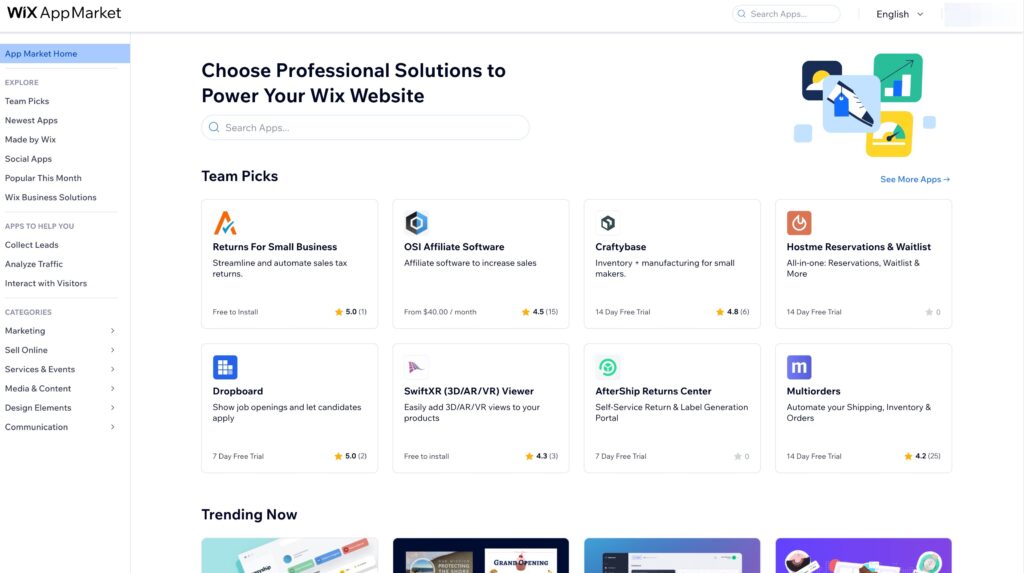
At first glance, Wix offers an App Market that’s seemingly similar to WordPress’s plugins, but it’s different. Wix provides a curated and small collection of about 300 apps that pales compared to the extensive library of WordPress plugins.
On a positive note, Wix does check all apps for compatibility, so you can rest assured that they will integrate seamlessly.
The themes are checked in the same way that the compatibility is better. Wix features over 800 themes. However, this is fewer than WordPress… but all themes function directly out of the box.
You don’t have to worry about tweaking code. Additionally, Wix’s visual theme editor is versatile and customizable, and you can design your own theme.
You only have to hire outside help if you find yourself doing something unusual. The platform is designed to be beginner-friendly. Conversely, you may have to hire a professional to help you construct your website, especially if you become frustrated trying to integrate plugins and themes.
WordPress
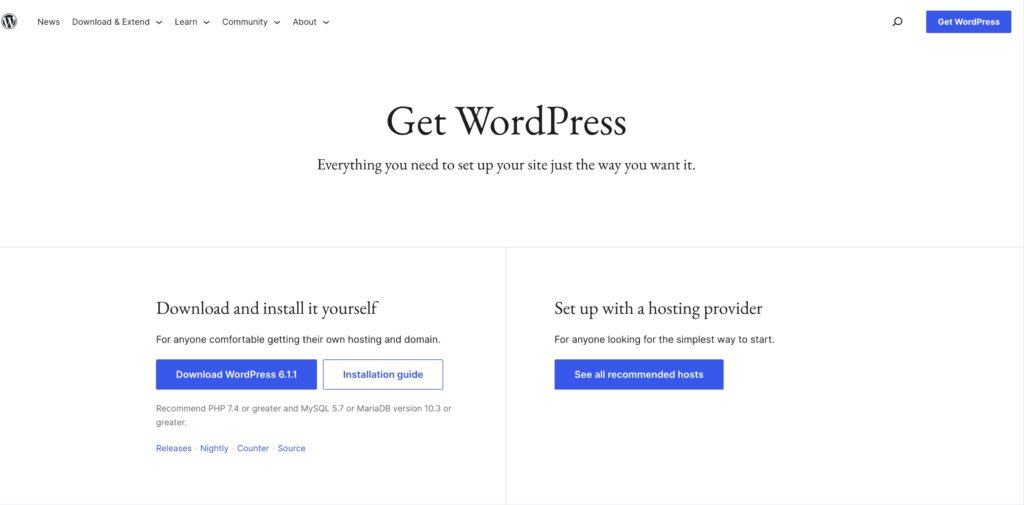
WordPress is an open-source CMS—meaning that anyone can add to it. This has great potential, but it carries its drawbacks as well.
The obvious advantage is that WordPress features many themes and plugins created by the community because it’s open source. Currently, there are more than 30,000 WordPress themes and over 60,000 plugins on WordPress on the web.; This is much more than any other website builder.
However, the extensiveness of WordPress can also be a downside. For example, WordPress backends can get quite confusing. The language and technical settings pages can get long and confusing.
Additionally, incompatibilities occur regularly, and remedying the problem can mean that users have to tweak their codes, which not everyone is adept at.
In the end, Wix is designed to be easy to use, while WordPress is designed for its flexible customization properties. Take your pick!
Maintenance and Security
Suffering a cyber security breach can cost a website millions of dollars. You may even lose customers because they lost trust in your site.
Below you’ll find the most common reasons that result in website hacks:
-
- The website utilizes an insecure plugin or theme
-
- The website’s server is improperly maintained
-
- The security policy has holes, such as a weak password or unnecessary permissions to others
-
- The website’s scripts are outdated
Since Wix operates using a closed system and Wix’s able team manages all fronts, from script updates to server maintenance, it is extremely secure.
Also, Wix is very strict regarding allowing third-party apps on their Wix App Market; all third-party developers must follow very selective security guidelines.
On the other hand, anyone can create a theme or plugin for WordPress and put it on the web. So if those themes or plugins are improperly coded, users’ sites will be susceptible to hackers.
Also, if you choose WordPress, you’ll be responsible for updating everything regarding website performance and security, including WordPress core, PHP, theme, plugins, SSL certificate, and more.
In the end, because WordPress uses third-party developers, the site is slightly less secure than typical Wix-made sites.
Analytics
Wix and WordPress support tracking tools and a variety of analytics, such as:
-
- Wix also provides a built-in analytics tool
The Google Tag Manager integration has lots of utility, and it allows you to third-party code, custom code, or pixels to your Wix site to track conversions.
WordPress’s versatility is unmatched, allowing you to integrate virtually any analytic tool into your site by adding custom code or using a plugin. Check out our article on how to add Google Analytics to WordPress.
SEO
Wix features top-notch website SEO practices that allow your site to rank highly on SERPs. That includes descriptions, meta titles, 301 redirects, alt tags, and other functions.
Also, Wix consistently adds updates and new features to their collection of available tools.
However, WordPress is more versatile and has a vast array of plugins at your disposal, making it the better platform for those who need advanced SEO programs.
For instance, RankMath, a top SEO plugin for WordPress, also has features for rank tracking, scanning indexing issues, internal link building, content optimization, and more.
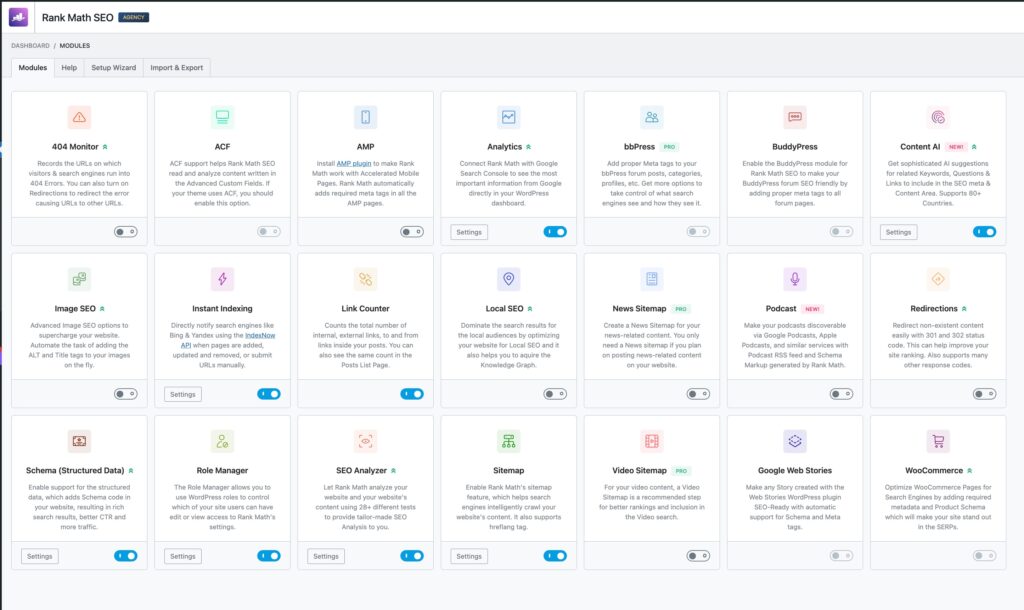
Blogging
Perhaps the focus of your site is blogging, then WordPress is a better option. The platform allows you to categorize posts more elaborately and display your blog content in various ways.
Wix’s built-in blogging tool is decent when compared to other hosted solutions. For example, it comes with an autosave feature and a revision history, which is unavailable for all competing platforms. You’ll find that the Wix blog is the perfect choice for many users.
It’s not surprising that Wix’s blogging features are less impressive than WordPress’s because WordPress began as a blogging platform.
Mobile Apps
A mobile app is a convenient component for those who want to offer a better user experience for visitors who like to visit the site while on the go. Here’s what Wix and WordPress have to offer:
WordPress
When using WordPress, you can use their application on your Android or iOS device and perform crucial management tasks seamlessly.
Examples include:
-
- Uploading photos and other media files
-
- Creating or editing pages/posts
-
- View site statistics
-
- Moderate comments
The only issue is that the app works best with a WordPress-hosted site. If you want to use it with a self-managed host, you’ll have to do some configuring and add a plugin (JetPack).
Wix
Wix also has an app called Wix Owner, and it’s available on Android and iOS, just like WordPress.
With this app, you can:
-
- Manage appointments
-
- Receive payments in-person
-
- Manage your eCommerce store (add new products, get notifications when someone makes a purchase, track orders, etc.)
-
- Manage events
-
- View website statistics
-
- Engage in live chat
-
- Edit and publish blog posts
While the Wix app offers more functionality, it could have a more responsive design. The app doesn’t automatically adjust the layout for your device. It’s decent but not as responsive as WordPress can be with proper configuration.
Customer Support
It’s essential when you’re building a site and managing your content that you have access to someone with expert knowledge that can assist you should you get stuck.
Wix
With every subscription, Wix provides users with email, chat, and phone support. With the more expensive plans, you also receive special customer service perks like skipping the line. They already offer a fast response time amongst reputable SaaS companies, though.
WordPress
Since WordPress is an open-source software program, they do not offer customer support with its packages.
However, if you purchase a plugin or theme, you’ll get support from the creators for that particular tool. You can also find community posts that address certain issues or a YouTube tutorial for assistance.
Ultimately, both offer some form of support, so it depends on your comfort level.
Ideally, you’d want customer service like what Wix offers because it streamlines the process of finding answers when you can go directly to a tech guru for help if you’re unsure how to proceed. Still, WordPress has at least this type of customer service with some plugins, and the community is responsive.
WordPress vs. Wix: Final Thoughts
Think of Wix as a one-stop-shop website builder that is easy to use and doesn’t require any expertise to get a beautiful finished product. It gets the job done, and it’s perfect for beginners.
WordPress is more flexible and powerful and offers ultimate creative control over your website, though it’s more challenging to learn.
Key Takeaways
Wix:
-
- Best if you don’t have a lot of technical experience in creating websites
-
- Easy-to-use platform with no coding required
-
- Drag-and-drop editor
-
- Free plan with restrictions
-
- Excellent customer service
-
- Closed Source
WordPress:
-
- Best of you’re tech-savvy
-
- Powerful
-
- Flexible
-
- Free plan with restrictions
-
- Limited customer service
-
- Open-source
-
- May need a developer to help with the setup
The ultimate choice as to whether you should choose WordPress vs Wix will depend on what you want. Evaluate your business plan and go from there, as both have advantages and disadvantages from the perspective of the user’s needs, knowledge, and experience.


